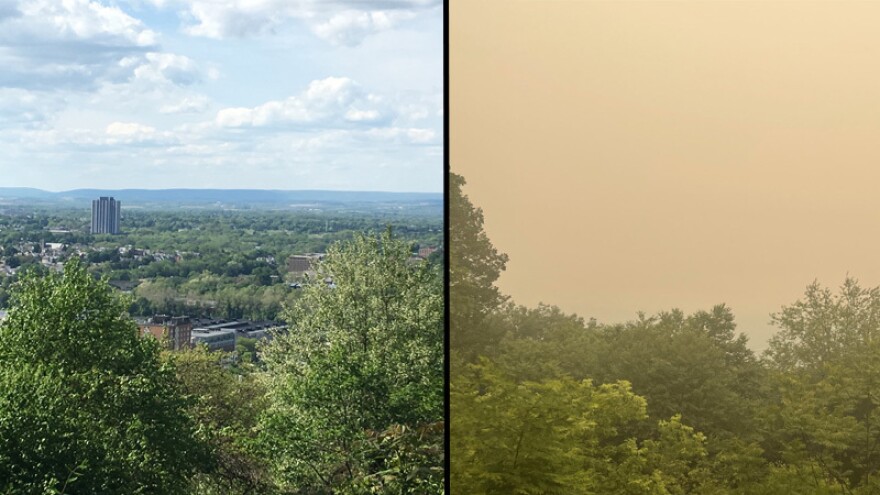BETHLEHEM, Pa. — Smoke from Canadian wildfires can be seen and smelled in much of the northeast, including the Lehigh Valley.
Now, local pulmonologists are weighing in about what to do to avoid too much exposure.
- Smoke from wildfires in Canada can be seen and smelled in much of the northeast, including the Lehigh Valley
- Local pulmonologists are weighing in with what to do to avoid too much exposure
- Close windows and doors, limit time outside and have air filters in place
"We are definitely seeing patients with chronic respiratory conditions calling in with concerns about their breathing,” said Dr. Douglas Corwin, pulmonary critical care doctor at St. Luke's University Health Network.
“They're feeling that their breathing is not quite as good as it was on the clearer air, so it is definitely affecting their quality of life."
Corwin said people with asthma, COPD, emphysema or other underlying lung diseases are most affected, but those without an underlying condition still can be affected by the poor air quality.
He recommended limiting outdoor activities as much as possible on days when air quality is down.
“For the people that have medications, make sure that you have enough of your regular medications that you take on a day-to-day basis, but also the medications that we consider rescue or emergencies such as albuterol, inhalers, nebulizers and things of that sort that you have enough to help yourself if necessary,” Corwin said.
'Probably affecting you'
Patients and parents also have been calling Lehigh Valley Health Network with concerns about the wildfire smoke in the area.
"If you're smelling it, then it's probably affecting you.”Dr. Jennifer Logan, pediatric pulmonologist, Lehigh Valley Health Network
“If you can smell it or sense it in other ways, like it's affecting your eyes, then definitely roll up your windows, try to make sure your air filter in your house is clean, and if you're smelling it, then it's probably affecting you,” said Dr. Jennifer Logan, a pediatric pulmonologist with LVHN.
Logan explained that the tiny particles in the air can go into the lungs and trigger an asthma flare, so people should have an asthma treatment plan in place and monitor children.
Wildfires and Air Quality
Here’s how to protect yourself:
Wildfire smoke can make the outdoor air unhealthy. You should also be aware that some of the smoke from the outdoors can enter your home and make it unhealthy to breathe indoor air, too. Here are actions you can take to reduce exposure, according to the EPA:
Avoid outdoor activities and stay inside
Keep pets inside except for short bathroom breaks
Keep doors and windows closed
Wear a mask, such as an N95 respirator mask
Set your HVAC system to recirculate mode, if possible
Close outdoor dampers on window air conditioners
Avoid activities that create more fine particles indoors, such as frying food, burning candles or spraying aerosol products
Air out your home if air quality improves, even temporarily
“Especially in children with asthma, they should have in place an asthma action plan that was put in place by their pulmonologist or their pediatrician, and I would recommend that parents follow that,” Logan said.
She said most children with asthma are prescribed albuterol or some version of albuterol and when they are coughing, they are typically instructed to use their inhaler every four hours.
“If they're having coughing fits that don't stop trouble breathing or respiratory distress, then they definitely would need to be seen either in their pediatrician office and express care or in the emergency department," she said.
Masks and limiting time outdoors
Logan said wearing an N95 mask can help block particles from smoke, however, other masks will not and may actually result in the collection of problematic particles in the mask itself.
"Unless it’s an N95, I would not recommend wearing a mask outside."Dr. Jennifer Logan, a pediatric pulmonologist with LVHN
"Unless it’s an N95, I would not recommend wearing a mask outside," Logan said.
Some daycares and schools canceled outside play Wednesday. Logan said the time children spend outside should be limited while the smoke is heavy, doors and windows should be kept closed, and clean air filters should be in place.
Both doctors recommend following the air quality reports in your area, even if a smoky haze is not visible.
"While the wildfires may be visually striking in terms of the haziness and everything else, there are many factors which affect the air quality and can make it difficult for those with chronic lung conditions,” Corwin said.
The federal air quality website can be found here.


